
49 minute read
Pages 14 and
Research fund receives additional £500,000 boost from Foundation
AFUND established by the MND Association and LifeArc to boost research into effective treatments for MND has been given an additional £500,000 by the My Name’5 Doddie Foundation.
The Translational Research Fund, which now stands at £1.5 million thanks to equal contributions from the Association, LifeArc and the My Name’5 Doddie Foundation, will be spent on research projects which are focused on developing new therapies or repurposing drugs already approved for other conditions.
The Association’s Director of Research Development, Dr Brian Dickie said: “Our understanding of the causes of MND has improved dramatically over the last two decades but the biggest challenge remains: to turn this knowledge into effective treatments. We believe MND is not incurable, but it is underfunded, so we are delighted that through the three charities teaming up, we are able to ensure our own £500,000 contribution, raised by Kevin Sinfield during his 7 in 7 Challenge inspired by his team-mate and friend Rob Burrow, will be used to maximum effect.” Doddie Weir, Founder of the My Name’5 Doddie Foundation, said: “This fund gives hope that something can be found soon for those living with MND like myself. Researchers in the UK and Ireland are already making good progress, but urgently need funding to take the science out of the labs and into clinical trials. We are excited to be teaming up with LifeArc and the MND Association who share our vision and hope this £1.5 million fund will make a real difference.”
Dr Melanie Lee CBE, LifeArc’s Chief Executive Officer, said: “The expanded fund will help to bridge the gap between fundamental research into MND disease mechanisms and the search for practical treatments. It means we can support more research grant applications of the highest quality with the greatest potential to make a difference to the lives of those living with MND.”
For more research news turn to pages 6 and 7.
Helping to make caring ‘visible and valued’
HELPING to make caring more ‘visible and valued’ was the aim of Carers Week 2021.
Together with five other charities, the Association supported Carers Week by calling on the Government to provide £1.2 billion of funding to enable unpaid carers to take all-important breaks. A report called Breaks or breakdown, which was published to coincide with Carers Week, showed, unsurprisingly, that carers are exhausted, with many unable to take breaks, particularly during the pandemic. The report featured Association members Dan and Mark who described their experience.
During the week, the Association enabled people affected by MND to meet with MPs to raise awareness of the disease and make the case for greater Government support for carers.
The Association offers carer grants of up £500 to support carers, young carers and bereaved carers. Please do apply if you need assistance. You can find the form on our website at www.mndassociation.org/grants
Taking a closer look at care research
WHEN we think about MND research our first thoughts are of laboratories and microscopes, and researchers looking into possible new treatments and a cure for MND.
While this work is vitally important in the fight against MND, there are a great many projects looking at ways to improve quality of life. One of these, funded by the MND Association with support from the Stanley Grundy Foundation, the Leslie Mary Carter Charitable Trust and MND Association branches, is a project that has been developing the MiNDToolkit – evidencebased guidelines for the management of behavioural symptoms in MND.
As well as the symptoms caused by damage to motor neurons, some people with MND experience changes in thinking, reasoning, and behaviour. These changes are referred to as cognitive and behavioural symptoms and, while these are subtle for many, around 15% of people with these symptoms will develop frontotemporal dementia (FTD). FTD results in more pronounced changes in behaviour, and this can have a significant impact on the lives of those living with MND, their families and carers.
Currently there are no established guidelines on how best to manage these behavioural symptoms. A team of researchers from the University of East Anglia, led by Professor Eneida Mioshi, pictured, has developed the MiNDToolkit. This is a collection of guidance for healthcare professionals, and strategies for carers and healthcare professionals to help manage behavioural symptoms. The advice is tailored to each carer. It is hoped that the MiNDToolkit will empower families, carers and healthcare professionals to better manage behavioural symptoms, improving the quality of life of those affected.
Developing the MiNDToolkit
As well as developing the MiNDToolkit itself, the team wants to see it used by professionals and families, ensure it works within a specialist MND setting and measure its impact.
The Covid-19 pandemic unfortunately meant that, like many research studies, the project had to be temporarily paused in March 2020. However, the team was keen to find a way to continue their work. As face-to-face delivery of the study was no longer possible, the team focused on converting the original MiNDToolkit into an interactive online platform, with three distinct areas – known as portals – targeted at carers, healthcare professionals and research administrators working on the project.
The carer portal includes screening, baseline and follow-up questionnaires about the symptoms of the person living with MND, and the results of the screening. This helps tailor the content of the online platform, ensuring the Toolkit remains relevant to users. The 16 modules offer advice and strategies on how best to manage behavioural symptoms of MND.
Healthcare professionals who have been trained to use the MiNDToolkit were very pleased with the flexibility of the new platform. It is hoped that the new online approach to the study may facilitate testing the MiNDToolkit in other countries with the team planing to make the platform accessible in various languages in the future.
The team is now busy setting up study sites to recruit participants for the feasibility phase. They want to ensure any technical issues that arise with the online platform are addressed in real time, while expanding the study to sites nationwide.
Next steps
The project is now entering the testing stage. This will help the team to determine the usability of the MiNDToolkit in specialist MND clinics, and to see if it works from a practical standpoint. This part of the project will involve the MiNDToolkit being trialled by a number of carers of people living with MND who display behavioural impairment.
This stage will also evaluate which assessments are best suited for future trials. Measures of quality of life, wellbeing and burden will enable the researchers to find the best way to measure the impact of the Toolkit in future. Following that, final adjustments will be made to the MiNDToolkit and the appropriate outcome measures selected prior to a pilot trial. The pilot trial will look at how effective the MiNDToolkit is at managing behavioural symptoms and improving quality of life for carers of people living with MND.
Because of the delays experienced due to the pandemic, the project is expected to end in June 2022. If you would like to find out more, you can visit the MiNDToolkit website: mindtoolkit.org.

Professor Eneida Mioshi
Welsh housing campaign brings hope of success
ACCESS to timely housing adaptations is a big issue for people living with MND and our members in Wales are certainly no exception.
This year, we launched a new campaign – Welsh Homes for MND – with the aim of making it easier for people living with MND to access the support and information they need when it comes to adapting their homes.
Using the Senedd elections in May as a platform, the Association has worked with people living with MND, healthcare professionals and politicians to help get the message across.
The campaign proved to be a huge success with the Welsh Government announcing that means-testing for small and medium Disabled Facilities Grants would be scrapped by April 2022. We will be monitoring the situation to make sure this commitment is put into practice.
We are now calling on the Welsh Government to ensure councils have a transparent, fast-track, nonmeans-tested process for housing adaptations.
Thanks to your support, Senedd members from all the main political parties have already expressed support for our proposal. Many of those who attended an online meeting in June were deeply moved by the stories of people with MND who had urgently needed support with their housing adaptations.
These stories – together with research into council services – form the basis of our Welsh Homes for MND report and the case for change. We presented this report to Senedd members in early October in front of a virtual audience of people affected by MND from across Wales.
For more information about the campaign and how to get involved visit www.mndassociation. org/welshhomesMND. MAE mynediad at addasiadau tai amserol yn fater mawr i bobl sy’n byw gyda chlefyd niwronau motor (MND) ac yn sicr nid yw ein haelodau yng Nghymru yn eithriad i hynny.
Eleni, lansiwyd ymgyrch newydd gennym - Cartrefi Cymru ar gyfer MND – gyda’r nod o’i gwneud hi’n haws i bobl sy’n byw gyda MND gael gafael ar y gefnogaeth a’r wybodaeth sydd eu hangen arnynt i addasu eu cartrefi.
Gan ddefnyddio etholiadau’r Senedd ym mis Mai fel platfform, mae’r Gymdeithas wedi gweithio gyda phobl sy’n byw gyda MND, gweithwyr gofal iechyd proffesiynol a gwleidyddion i helpu i gyfleu’r neges.
Profodd yr ymgyrch yn llwyddiant ysgubol gyda Llywodraeth Cymru yn cyhoeddi y byddai profion modd ar gyfer Grantiau Cyfleusterau i’r Anabl bach a chanolig yn cael eu dileu erbyn mis Ebrill. Nawr mae angen i ni sicrhau bod yr ymrwymiad hwn yn cael ei roi ar waith ar lefel leol.
Rydym nawr yn galw ar Lywodraeth Cymru i sicrhau bod gan gynghorau broses dryloyw, llwybr cyflym, heb brawf modd ar gyfer addasiadau tai.
Diolch i’ch cefnogaeth, mae Aelodau’r Senedd o’r holl brif bleidiau gwleidyddol eisoes wedi mynegi cefnogaeth i’n cynnig. Mynychodd llawer ohonynt gyfarfod ar-lein ym mis Mehefin lle cawsant eu symud gan straeon pobl ag MND a oedd wedi bod angen cefnogaeth ar frys gyda’u haddasiadau tai.
Mae’r straeon hyn – ynghyd ag ymchwil i wasanaethau’r cyngor – yn sail i’n hadroddiad Cartrefi Cymru dros MND a’r achos dros newid. Fe wnaethon ni gyflwyno’r adroddiad hwn i aelodau’r Senedd ddechrau mis Hydref o flaen cynulleidfa rithwir o bobl o bob rhan o Gymru yr oedd MND wedi effeithio arnyn nhw.
I gael mwy o wybodaeth am yr ymgyrch a sut i gymryd rhan, ymwelwch www.mndassociation. org/welshhomesMND.
Gobaith am lwyddiant gydag ymgyrch tai Cymru
‘I will be here for Casey until my last breath’
THE saying love conquers all could have been written for Samantha and Casey Webster, who celebrated their first wedding anniversary in August.
Last summer, the devoted couple were finally able to marry in front of a small group of family friends, having had their original plans cancelled due to the Covid-19 pandemic.
It was a dream come true for Samantha and Casey from Liverpool, who have faced enormous challenges since Casey was diagnosed with MND at the age of just 19.
Samantha said: “It was the perfect day. We got married at the town hall and then had a marquee for 30 guests. It was wonderful to be surrounded by our family and friends and all those closest to us.”
It was a day to cherish for Samantha and Casey, who were first introduced by mutual friends. Casey messaged her and they chatted over Facebook for a while before he plucked up the courage to ask her out on a date.
She said: “We met at KFC and we didn’t stop talking! We talked about anything and everything. We fell in love, got a flat together and just started living a normal life.” “Casey is my soulmate and he always has been. He’s the same person I met four years ago, and I will be here, loving him and caring for him until my last breath.”
It was early on in their relationship that Casey started experiencing pains in his back and legs and the couple started to fear that something wasn’t quite right.
Samantha said: “He went to the gym quite a bit, so at first we didn’t worry. Our GP was quite concerned that it may be something affecting his brain. So he had lots of tests including an ECG (Electrocardiogram) and lumbar puncture. Then, one day I got a call from Casey to say that I should go
to the hospital.” When she arrived, Samantha learnt that Casey had MND and, in that moment, the couple’s world shattered. She said: “I had heard of Stephen Hawking, but knew nothing about MND. We knew it was incredibly rare for him to be diagnosed at such a young age – Casey was 19 and I was 20. “We’d had so many aspirations, so many The couple celebrated their fi rst anniversary in August plans for the future. We wanted to have children together. We were completely devastated. “As time went by, Casey told me I should go, that I was wasting my time, that I should get on with my life and that he didn’t want to hold me back. But I knew Casey was my soulmate and that I would be there for him, no matter what.” Supported by her mum and dad, Samantha and Casey slowly started to adapt to their new life and in March 2019 the couple got engaged. They planned to marry a year later – but then the world changed. Samantha said: “Lockdown was really, really tough and definitely had an impact on Casey’s mental health. We’ve had to make changes to the house. We’ve moved from an upstairs flat to a downstairs flat, we now have shower chairs and hoists in the bedrooms and living room and we have a mobility van which means that we can now get out and about for walks and days out on the beach. That has helped enormously. “We have been living with MND now for three years and things are changing. We are making plans for the future and Casey is keen for me to go to university, so I’m planning to go in 2022 – I’m going to study to be a dentist. “Casey is my soulmate and he always has been. He’s the same person I met four years ago, and I will be here, loving him and caring for him until my last breath.”
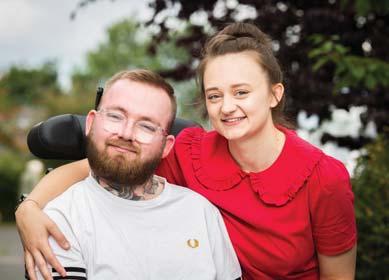
Charlotte Hawkins



FUNDRAISERS Stuart Bates and Charlotte Nichols have crossed the finishing line of their gruelling Olympic challenge, raising more than £145,000 to support people living with MND.
The couple completed all 102 events featured in the Tokyo Olympic Games in just 17 days, finishing with a marathon in front of a packed crowd in Weymouth.
Stuart, a window cleaner, and Charlotte, a student doctor, were aiming to raise £10,000 in memory of Stuart’s brother, Spencer, who was known as Spenny, who died of MND ten years ago.
The pair spent around eight months meticulously planning how to achieve all 102 events in the short time frame, while squeezing in long training hours around working full time. They also recruited around 60 current and former Olympic athletes to be ambassadors for the event with many taking time out of their Olympic preparations to help the couple learn the basics of their complex sports.
Stuart and Charlotte said: “We are feeling a mixture of elation, pride and exhaustion! It was the perfect ending to finish in Weymouth where Spenny spent his whole life, and to cross the finish line with a huge group of friends, family, well-wishers and world media was completely overwhelming.
“Completing 102 Olympic events in 17 days has been physically demanding and taken us to places mentally that we didn’t know existed. To know that we have raised nearly £150,000 for the MND Association makes all of the pain worthwhile and the messages of support that we have received from those affected by MND throughout have driven us on when it felt impossible. We will continue raising awareness and money until a cure is found.”
Russell Spivey, Regional Fundraiser at the MND Association said: “I have the honour of supporting many great fundraisers, branches and groups and I think Stuart and Charlotte captured the spirit of the whole MND Association with the Spennylympics. Their fundraising is phenomenal and the awareness they have raised of MND on a global stage is immeasurable.”
You can still donate via the Spennylympics Just Giving page. For more details visit www. justgiving.com/fundraising/spennylympics
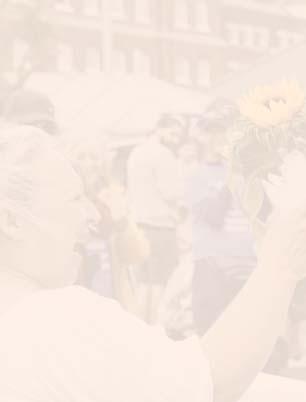

Golden couple after raising £14 memory of Spe
celebrate 45,000 in nny

Friends go the extra mile in honour of their dads

TWO friends, whose fathers are both living with devastating conditions, have taken part in seven marathons over seven days to help raise funds and awareness.
Matt Pullinger and Matt Guest ran a total of 183.4 miles over the course of a week – taking them from Kempston in Bedfordshire to Manchester where they ended their challenge by taking part in the Manchester Marathon on 10 October.
The friends, who are both teachers in Bedfordshire, ran for their dads – John Pullinger and Malc Guest, who are living with MND and Multiple Sclerosis (MS) respectively.
John was diagnosed with MND during lockdown in April 2020. Since then, the whole Pullinger family has been determined to do everything possible to support the Association and set up a Fightback Fund to help raise much-needed funds. Malc was diagnosed with MS in 1990 and Matt took part in the event to raise money for the local therapy centre which supports him.
For more information about their challenge, or to donate, visit www.justgiving.com/fundraising/ matts7in7
For more information about Fightback Funds visit www. mndassociation.org/fightback
Finding information turns a new page
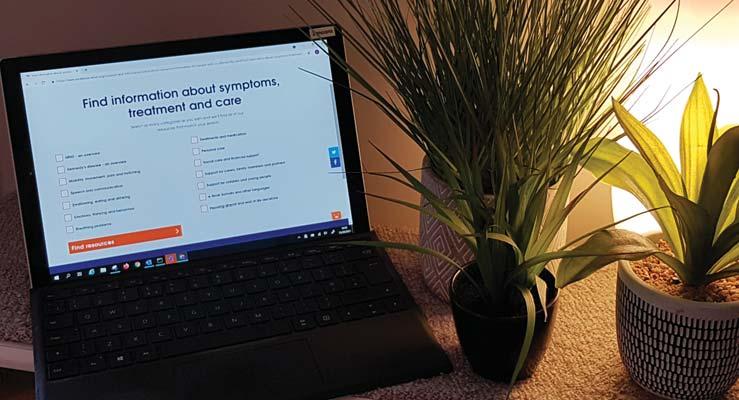
HOW can you find all the information you need about MND, in a format that works for you? By using our new Care information finder, a clever online search tool on the MND Association’s website, which helps visitors search easily for care resources.
As someone with MND told us, ‘There is so much information available (which is great!) that it can take a while to find what you’re looking for, so an information finder is a brilliant idea.’
The search categories include symptoms and care support. Each category selected will result in a package of links to all relevant resources. For example, if you selected speech and communication, you would receive a list of links to every publication, format or web page for that subject. This means you will receive only what you want in your search and you won’t miss any relevant information resources.
It will include newer formats too, such as animations and EPUBs, for use on e-reader apps. An e-reader app enables you to change the text size, but the words reflow to fit whatever size of screen you’re using.
“There is so much information available (which is great!) that it can take a while to find what you’re looking for, so an information finder is a brilliant idea.”
Our user reviewers felt the Care information finder would be extremely valuable. One told us, ‘This way of searching is so simple, clear and easy, and the fact that it works as well on a mobile as on a computer is a win-win.’
Once you have the information you need, you can send the links to a family member, friend, or health and social care professional. Share one resource, all resources in a chosen category, or an entire page of results if you selected multiple care categories. The links are sent with a quick auto-generated email, but it’s entirely private. One user said, ‘I like that you can also send the email to yourself as a search result, as it’s handy to study the links at leisure.’
You can explore the Care information finder at www.mndassociation.org/ careinfofinder. If you would like to see a list of all our care information, go to www.mndassociation.org/careinfo.
To order printed copies of our publications, contact our MND Connect helpline: 0808 802 6262 mndconnect@ mndassociation.org
See page 25 for a list of new information launches.
Turning the focus on communication
NOVEMBER marks the first anniversary of the launch of the Communication Access Symbol, developed to help companies learn more about accessible communication and how best to support their customers.
The symbol has been created by the Royal College of Speech and Language Therapists (RCSLT) in partnership with charities including the MND Association.
Once they have taken part in the appropriate training, businesses and organisations across England, Wales and Northern Ireland can display the Communication Access Symbol, demonstrating support for customers who may be experiencing communication difficulties.
So far, more than 4,500 organisations and individuals have registered for Communication Access eLearning and on Wednesday, 17 November the RCSLT will be encouraging more to sign up.
For more information visit www.communication-access.co.uk
Carers learn a new skill during online event
ENCOURAGING carers and former carers to take time out for themselves, meet others and learn a new skill was the aim of an online art group held over the summer.
The six-week course, funded by a grant from the Kent Community Foundation and hosted by award-winning artist Tracie Peisley, saw seven people, who care for loved ones with MND and Kennedy’s disease, take part in sessions online.
Each carer was sent a box of art materials, including paint and clay, which Tracie then used to guide them through various activities.
Tracie explained: “It was important for them to take time for themselves and I helped to create a safe space for that. The work they did reflected the love they shared for their partners and loved ones and often happy shared experiences such as holidays. I think the sessions have also created a positive ripple-effect. I know some of those who attended will want to share their skills and experiences with loved ones.”
Among those who took part in the sessions was Carol Swain, whose husband Pete is living with MND.
She said: “I really ummed and ahhed about taking part because I am no artist, but I decided to give it a go. The group
Artist Tracie Peisley, who hosted the online sessions
was very encouraging, and Tracie really held us together, guiding us and talking to us.
“When the box arrived, it was just like Christmas! It was full of paper, pencils, clay and glue, everything we needed to get started. I’m not very good at art, but I can cook, so when it came to using the clay, I took inspiration from pastry. Inspired by holidays to the Mediterranean, I created plates with lemons and oranges on them and I was really pleased with the results.”
Association visitor Judy Keay, whose husband died from MND, said the sessions gave carers the chance to take their focus away from their responsibilities for a short time, something which is vital for mental health and wellbeing.
She said: “It gave us all inspiration to try something new and creative. I’ve decided to carry on painting, and I’ve even enrolled in an adult education course nearby.
“Activities such as art and sport are so important for the wellbeing of carers and these online sessions were very wellreceived.”
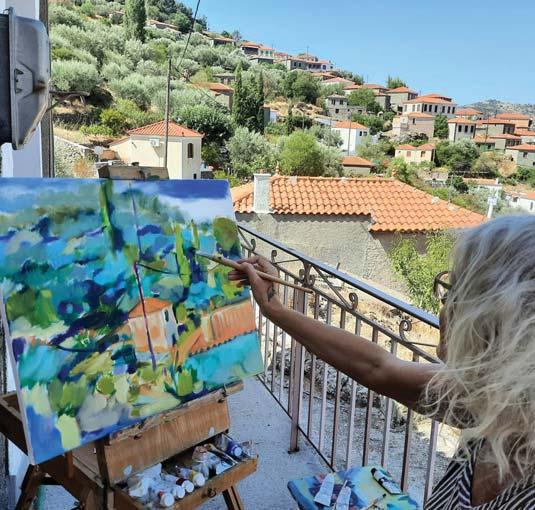
Bringing all our communities together
AS part of our commitment to Diversity, Equity and Inclusion, the Association is in the process of setting up a number of new network groups.
The groups enable people with the same or similar experiences to come together, to raise awareness of a particular community and to help us make sure that the decisions we make meet the needs of all those we represent.
Our first network group for the Lesbian, Gay, Bisexual, Trans, Questioning+ (LGBTQ+) community launched in September with other groups for the Black, Asian and Minority Ethnic (BAME) community, disabled and women set to be launched by the end of the year.
Membership of the networks is open to staff, volunteers, people with, and affected by, MND and anyone else with an interest in the work we do. In due course it may be extended to include people who are supportive or allies of the community.
People can be involved at whatever level they wish. While some will simply want to be kept informed, others will want to play a more active role and get involved in initiatives and specific projects. There is no minimum commitment and members can dip in and out in line with their circumstances.
For more information, contact the Association’s Head of Diversity, Equity and Inclusion, John Gillies-Wilkes at john.gillies@mndassociation.org
Meet the MND professionals: speech and language therapists
A large number of professionals are involved in the care of someone with MND. In this series, we discover more about the valuable support these professionals provide and how you can make the most of the services they offer.
Further information
We have a number of related resources you may find useful: Eating and drinking with MND guide Information sheet 7A – Swallowing difficulties Information sheet 7B – Tube feeding Information sheet 7C – Speech and communication support Information sheet 7D – Voice banking
We also have further information for professionals: Information sheet P3 – Managing saliva problems Information sheet P8 – Dysphagia Information sheet P10 – Voice banking AAC Pathway for MND
Motor neurone disease: Communication, speech and language support We are proud to launch our new guide for health and social care professionals who are supporting people with MND who have speech and language challenges. It has been written to help professionals provide the best possible communication support to people with MND, their families and carers.
Download from www. mndassociation.org/publications or contact MND Connect to order hard copies. Call 0808 802 6262 or email mndconnect@mndassociation.org
n, tw •
i l ith

Speech and language therapists provide support with swallowing and communication Sp
SPEECH and language therapists (SLTs) provide treatment, support and care to people with MND in two main ways: • Assessing and treating speech, language and communication problems to help people communicate better, including supporting access to communication aids. • Assessing, treating and developing personalised plans to support people living with MND who have eating and swallowing problems.
Using specialist skills, SLTs work directly with people living with MND and their carers to provide them with tailored support. They also work closely with other health professionals, such as doctors, nurses, and dietitians.
Because they are involved in both swallowing and communication, it may occasionally mean that speech and communication needs can be overlooked. It is important to ensure the SLT considers both aspects of your care, so do ask if your speech and communication needs are not being met.
How to access support SLTs work in a wide variety of settings, including community health centres, hospital wards and intensive care units, outpatient departments and peoples’ homes. The NICE guideline on assessing and managing MND recommends that an SLT should be a core member of the MND care team. Ask any member of your care team to refer you to an SLT if this is not the case.
Care information update
Sex and relationships
Our new booklet on sex and relationships can help promote open and sensitive conversations with partners and health and social care professionals. Regardless of your sexuality, this booklet, which has been endorsed by Relate, helps explore ways to maintain physical connection and replaces the previous information sheets 13A and 13B.
The response during development has been incredibly positive, with lots of encouraging feedback. One person affected by MND said: “It helps to be open about a difficult subject, where normally nothing would be said. This stops people with MND from being isolated, as somebody cares and that is important. Information to support sex and intimacy also helps you feel less alone.”
Sex and physical affection may be an important part of your emotional life and affect your sense of wellbeing. If you are living with MND or Kennedy’s disease, or are the partner of someone who has been diagnosed, you may be worried about the impact of impaired movement on intimacy. Medical equipment, such as assisted ventilation or a feeding tube, can also cause concerns.
Dee Holmes, Senior Practice Consultant at Relate, said: “Both motor neurone disease (MND) and Kennedy’s disease can impact on relationships, sex and intimacy. This guide openly and sensitively addresses likely issues, with ways to maintain intimacy and find support. Whether single and living with either condition, in a relationship or the partner of someone who has been diagnosed, this inclusive guide is well worth a read.”
Find this booklet at: www.mndassociation.org/relationships
Care information finder
Our new search feature is now up and running on our website. It’s designed to help you find the information you need more easily. You can read all about it in our launch article on page 22. Find the Care information finder at www. mndassociation.org/careinfofinder
Information sheet 14A – Advance Decision to Refuse Treatment (ADRT)
We have revised this sheet about making advance decisions on life-sustaining treatment to ensure it remains up to date. We’ve also added more information on power of attorney.

Care information vlog
We have released a new vlog, with updates about all the work we’ve been doing throughout the pandemic. Find the vlog at www.mndassociation.org/ careinfo
e-Book resources for e-reader apps
We previously mentioned the launch of a new EPUB (electronic publication) format for a selected number of our resources. This format can be read on e-reader apps where text can be resized and reflowed to fit the size of screen you are using. See more in our article on page 22. Find these resources in the e-Book drop-down option at: www.mndassociation.org/careinfo
See all of our resources at: www.mndassociation.org/publications or order printed copies from our MND Connect helpline: 0808 802 6262, mndconnect@mndassociation.org
Our information development is accredited through the PIF Tick scheme. This means our resources are evidenced, user tested and reviewed by experts.
Trusted Information Creator
Would you like to help with our information development?
We work alongside people with MND or Kennedy’s disease, and their carers, to develop and improve our information. We have lots of work planned in 20212022. If you would like to get involved, you will have opportunities to feed into a range of different content and formats.
You can pick and choose which tasks you want to work on and make a difference from the comfort of your own home.
To find out more, contact: infofeedback@mndassociation.org
Helping to make personal care easier
JOHN O’ GROATS
From Land’s End to John O’Groat’s the blinking hard way!

IT took eight months and more than 1.4 million blinks but in July Phil Rossall finally completed his challenge of blinking the length Britain.
Phil, who was diagnosed with MND in 2016 and is now unable to move his limbs or breathe for himself, converted the 874-mile distance from Britain’s most southerly point, Land’s End, to John O’Groats, in the very north of Scotland, into blinks helping to raise £1,000 and awareness of MND.
“When you are stuck indoors watching all your muscles die, it’s nice to know that you can still do something amazing. I hope it will raise awareness of MND and money for the wonderful MND Association.”
Phil, a former teacher, is no stranger to a challenge having broken the Guinness World Record for the full marathon push alongside his friend and former colleague Marcus Green in December 2019. He has also blinked his way up the Three Peaks and Mount Everest, and written a book called Motor neurone disease: The fun bits.
Phil explained: “I did it to cheer people up. When you are stuck indoors watching all your muscles die, it’s nice to know that you can still do something amazing. I hope it will raise awareness of MND and money for the wonderful MND Association. It’s a bit late for me, but we must find a cure, which is why I am matching funds for the next £1,000 raised. If an ex-teacher like me can dig deep, we all can make a contribution, however small.”
Regional fundraiser Russell Spivey said: “I’m honoured to support many people raising funds for the MND Association in my role, but Phil is blinking amazing.
“The courage and humility he shows in fighting this disease with everything he’s got is so inspirational, and no doubt motivates many people to do the best that they can in the battle to see ‘a world free from MND.’
“Phil has broken marathon records and climbed the highest peaks but 1.4 million blinks while facing the ravages of MND, always with a smile, good humour and the support of his wife Brenda, is absolutely remarkable.”
To read more or to donate please visit https://www.justgiving.com/ fundraising/phil-rossall3
LAND’S END
Let’s keep on talking about communications aids
MAKING sure people living with MND have timely access to the communication aids they need has been a key priority throughout the pandemic.
While many face-to-face appointments have been cancelled, assessments have continued to take place online and via phone calls, making appointments more efficient and, in some cases, leading to quicker outcomes.
Access to Augmentative and Alternative Communication (AAC) and Environmental Controls (EC) has continued to improve in recent years, thanks to the work of a group of people living with MND, including Liam Dwyer, who has worked alongside the Association and NHS England to ensure people living with MND get access to the support they need when they need it.
Liam explained: “Matthew Hollis from the MND Association and Carolyn Young and Cathy Edwards from NHS England are like little beavers working away in the background. Was it not for the support these three people have had from NHS England and the MND Association, the service would not be what it is today. There is always more that can be done so we continue to work closely alongside professional colleagues to ensure people living with MND like myself get the right equipment at the right time.”
There are 17 dedicated specialist centres in locations across England, Wales and Northern Ireland which are an important contact for people living with MND.
The Association receives regular updates from the specialist centres, which shows average waiting times for assessments right through to the provision of communication aids.
· In England, all of the specialist centre contact details are available at www.assistivetechnology.org.uk
· In Wales, the specialist centre contact details are available at https://cavuhb.nhs.wales/our-services/artificial-limb-andappliance-service/electronic-assistive-technology-service/

· In Northern Ireland, the specialist centre contact details are available at www.communicationmatters.org.uk/ assessment_service/communication-advice-centre/
If you are unable to access the links above, please call our MND Connect helpline for free on 0808 802 6262.
For more information about communication aids and the support available from the MND Association visit www.mndassociation.org/communicationaids
If you find that you do not meet the criteria of the specialist centres and are struggling to be provided with a communication aid through your local or community NHS service, please let us know by emailing communicationaids@mndassociation.org or calling MND Connect on 0808 802 6262.
“There is always more that can be done so we continue to work closely alongside professional colleagues to ensure people living with MND like myself get the right equipment at the right time.”
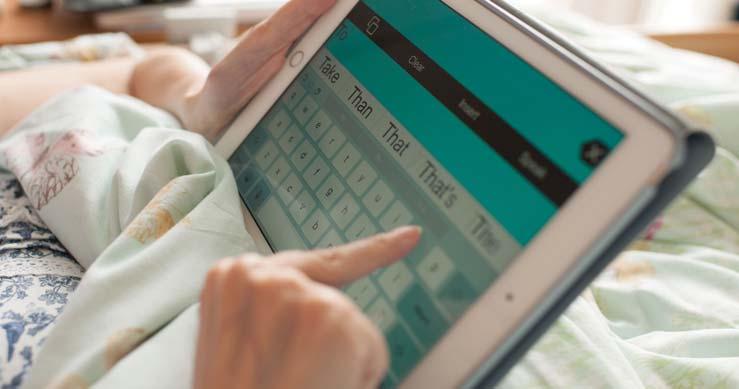
Remembering our former trustee and friend, Dr Andy Fowell
ANDY Fowell, a former MND Association trustee and active supporter and fundraiser, has died.
Dr Fowell, who was a retired palliative care consultant, died in an accident on 25 September. He was married to Anne and had two children, Rachel and Richard.
In March 2019, Dr Fowell was among the cyclists who took part in a mammoth eight-week cycle challenge from Asia to Anglesey to raise money for the MND Association and St David’s Hospice in Llandudno. The challenge took Dr Fowell and his friends, Steve MacVicar and Roger Thomas from Istanbul in Turkey to Anglesey, raising a total of £25,000.
AN author who is living with MND is hoping to use her skills to raise money for MND research. Helen Brunton was diagnosed with MND 11 years ago, just days after her mother died from the same devastating disease.
Since then, Helen has volunteered to be involved in clinical trials and wants to use her own experiences to help raise awareness of MND and support others.
She explained: “11 years ago I watched my Mum quickly deteriorate and die from MND while suspecting for some time that I had the illness too. For months before my Mum even became ill I was struggling to walk and even though I suspected I had MND my neurologist was telling me I didn’t - this was the worst time for me, the not knowing! I eventually asked to
THE Association has launched a new project to look closely at the needs of unpaid carers.
We’re encouraging people who provide unpaid care to share their thoughts, views and experiences by being interviewed, attending a virtual focus group or completing a survey. Dr Fowell was elected to the Association’s Board of Trustees in 2013 and served until July 2016. He was also instrumental in both setting up and developing Advance Care Planning in Wales and in establishing the North Wales MND Service. Richard Coleman, Chair of the Association’s Board of Trustees, said: “Andy was a great colleague and made much-valued contributions to the Board and to the Care Committee, to which he was co-opted after he stood down as a trustee. His experience and depth of knowledge, coupled with empathy and compassion, always added significantly to our discussions. The thoughts of the whole Association are with Andy’s family
be referred to an MND specialist and within minutes of hearing my story and examining me he told me it more than probably was the illness. I was diagnosed officially in early 2011.
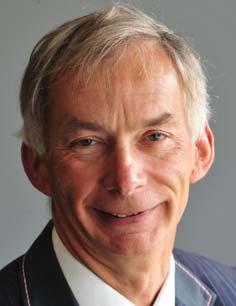
Dr Andy Fowell
and friends at this very difficult time.”
In a statement, Dr Fowell’s family described him as a ‘passionate cyclist’ who would be ‘sorely missed.’
Author Helen is starting a new chapter

Author Helen Brunton
“My passion has always been art, but I struggle holding a brush or a pen so I decided to use my one strong digit to write a book on my iPad. It just flows out of me, I love writing. I’ve now published two books, All Yellow and Gorfen Letch, but the third in the trilogy is the one I really want to write. The main character has MND as I want people to understand more about the day-to-day reality of living with the condition and the problems we encounter.
“I want to remain independent as long as I can. It might take me an hour to do a ten-minute job, but I usually get there in the end and then I go out and enjoy the bird song and the fresh air - the simple things in life are always the best.”
Helen’s books, which are helping to raise money for the Association, are available to buy on Amazon.
We’re caring for our carers
As a result of the project, we hope to campaign on the issues that matter most to unpaid carers and ensure the Association continues to offer the right support.
More information about how to get involved will be available soon at www.mndassociation.org/support-andinformation/for-carers/
Autumn fundraisers are up and running!
Kate Hills, who took part in the Brighton Marathon, pictured with her daughter Rose, who took part in The Mini Mile

IT has been a busy autumn for our incredible #TeamMND runners who have taken part in events including the Great North Run, Brighton Marathon and London Marathon to raise money for the MND Association.
The Vitality Big Half was the first mass running event of the #TeamMND calendar, with 27 runners covering the 13.1-mile route through London on 22 August.
The Association’s Senior Policy Adviser, Daniel Vincent, took part with his brother Josh in memory of their Grandad Alan who had MND. Daniel said “Our Grandad was diagnosed with MND in the February 2001 and died in June the same year, so his progression was quick. I remember him slurring his words and eventually not really being able to understand what he was saying.
“He was a jolly man who loved us very much – the idea of not seeing us grow up was definitely one of the things he found hardest.”
Together they raised over £1,700. #TeamMND was represented in the Great North Run, in Newcastle and the Brighton Marathon which both took place on 12 September.
Dr Tony Gill completed the Great North Run alongside his daughter Becky, 40 years after he ran the very first event. He said: “It was a unique experience to take part in the 40th Great North Run with my daughter, and an honour to be on the start line with her. Forty years ago I finished 43rd and have run many since. Having raised more than £1,000, it was definitely worth all the aches and pains!”
While 244 of our runners were pounding the streets of Newcastle, 350 miles south in Brighton our 70-strong team were facing a very warm marathon in the seaside city.
Kate Hills, who has never taken part in a running event before, signed up to take part just six weeks before the event. She said: “I just wanted to do something that would shock people, something they wouldn’t expect. So I thought I’d do a marathon! Mum was finally diagnosed with MND nearly a year ago. She is now mostly in a wheelchair, has nearly lost the ability to speak and can only eat pureed food. It is such a cruel disease, I wanted to do something to fight back.”
Kate’s plan to surprise her friends and family with her fundraising challenge certainly worked - she raised almost £2,000, smashing her £500 target.
Sunday 3 October saw the return of the most iconic of all running events, the long-awaited 2021 Virgin Money London Marathon.
MND Association patron Kevin Sinfield OBE led our team of 200 runners in the mass race, along with 81 people who took part virtually across the UK. Kevin said “I’ve seen first-hand the devastating effect an MND diagnosis has on a family. Like others taking part for #TeamMND I’m dedicated to making sure families in future don’t have to go through that heartbreak. I firmly believe a cure for this cruel disease can be found and until that day we need to make sure those affected have the support they need.”
Feeling inspired? Why not make 2022 the year you join #TeamMND? For more details about all the running events available visit www.mndassociation.org/running
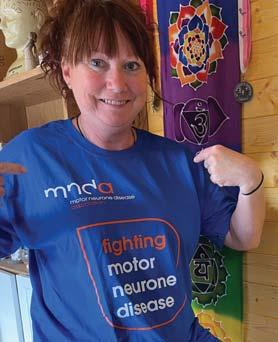
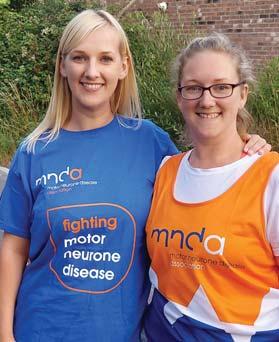
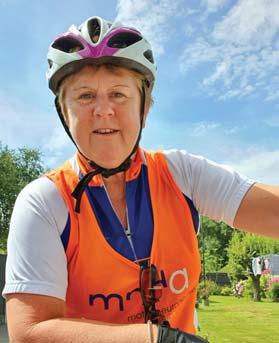
Teresa May, Rachel Goddard, and her sister Naomi Storeton-West and Julie Leyland who all took part in Mission 5000 during August
Supporters accept our epic fundraising mission
MORE than 270 supporters accepted our fundraising mission – to join together to cover 5,000 miles in any way possible to help raise money to support people living and affected by MND.
Throughout August, our incredible team of fundraisers came up with all sorts of ways to add miles to the combined 5,000 target – one mile for every person living with MND in the UK. Together they clocked up 19,749 miles and raised £63,789. 50-year-old Julie Leyland was one of a number of people living with MND who took part. She was diagnosed with primary lateral sclerosis (PLS) in December 2019, four years after first experiencing symptoms.
She explained: “It now affects my upper limbs, speech, swallowing, my motor skills and reflexes. I have spasticity (stiffness) in my muscles, but I don’t have any muscle wastage. If you saw me sitting down you wouldn’t guess there was anything wrong with me, that is until I speak or go to walk.
“Developing a degenerative condition like PLS has meant that my whole social life and personal life has changed. I used to be someone who actively organised social events with friends, through walking, holidays or breaks away. However, when Covid hit, my relationship broke down and I found I was facing this alone but with the support of a very good friend.”
Julie set herself the target of covering 100 miles, all on her static bike.
She said: “My condition affects my balance, and I am unable to ride a bike outside, so indoors it is! This challenge has meant that I can give something back to the MND Association for the support I have received from them. From asking for advice, funding towards equipment and benefits advice, it has made me feel like I can chat to people who really understand and that I am not alone. The work they do is invaluable.
“It’s very easy to sit down and mope about the losses which will become more as time goes by, rather than appreciate what I can still do right here and now. So, as long as I can sit on a stationary bike and push my legs to move, then I will do.”
Some Mission 5000 participants chose to walk their miles, including Teresa May who took part in memory of her wife Lynn who died from MND.
Teresa set herself an ambitious target to walk 300 miles during the month and raise £5,000. Before the challenge she said: “I’ve had five knee operations along with a hip replacement, so to walk a minimum of 10 miles every single day in August will be harder than the 55-mile cycling challenge I completed from London to Brighton in 2018. l’m hoping all this walking doesn’t reduce me from 5ft 2 to 4ft 11!”
With support from friends and family, Teresa has helped to raise more than £12,000 for the Association in Lynn’s memory by organising a series of fundraising events.
Like Teresa, Rachel Goddard walked her miles, setting herself a target of 66, in memory of her mum.
She said: “Mum would have been 66 this year so every mile means something to us as a family. I am hoping to raise money to help fund equipment to support people living with MND and to help find a cure. Although Mum isn’t here to be involved in the challenge, I know she is right behind me. I miss her every day.”
Have you caught up with the Association’s MND Matters podcast? In Episode 2, our hosts Steph and Nick speak with Megan Donoher who took part in Mission 5000. Listen now by visiting www.mndassociation.org/ podcast
‘Dad’s tribute page makes me feel close to him’
WHEN Jasleen Cheema’s father Harmesh died from MND last October, she was determined to do everything possible to remember him and keep his memory alive.
Jasleen and her family decided the best way to do that would be by setting up an MND Association Tribute Fund, enabling them to share precious memories of Harmesh while supporting the Association at the same time.
She explained: “Dad’s tribute page brings a lot of comfort for me and my family and it’s somewhere I go to feel close to him. Being able to use the page in so many ways is wonderful. I lit the Christmas candle and thought it was a lovely sentiment during the festive period.”
Jessica Macdonald’s Dad Jim died from MND and her family set up a Tribute Fund in his memory during the pandemic. Since then, her family and friends have come together to share lovely thoughts, light candles and leave virtual gifts on the page. Jessica, who lives in New Zealand has also used the page to help raise funds and awareness of MND.
She said: “The tribute page is an excellent way to collate memories and fundraising, especially when family, friends, colleagues and well-wishers are so spread out across the globe and were unable to come together for a funeral or wake during Covid-19 restrictions.
“After losing Dad so suddenly, putting our efforts into fundraising gave us a new-found purpose. The website itself was so easy to navigate, to personalise and add photos and memories too, and I only wish I’d found the option to make a site earlier.”
Every pound you raise in memory of a loved one helps to support people living with MND and ultimately takes us a step closer to finding a cure for a world free from MND. If you’d like more information on Tribute Funds then please contact Emma Fellows or Kavita Parmar at tributefunds@mndassociation.org or 01604 611864.
And if you need bereavement support the MND Connect team are just a phone call away on 0808 802 6262.
Episode 6 of the Association’s MND Matters podcast features interviews with Matthew and Nathalie, whose fathers both died from MND. To listen visit www.mndassociation.org/ podcast or download from your usual provider.

Harmesh, who died from MND in October 2020
Association has ‘a big place in people’s hearts’
THE MND Association has been named as the second most loved charity brand in the disability category of a nationwide survey.
The report, The Top 100 Most Loved Charity Brands 2021, is based on 60,000 interviews carried out by Savanta’s market intelligence platform BrandVue Charities, a brand, audience and supporter tracking engine. The results recognise and celebrate the most emotively connected brands within the third sector.
Overall, the Association claimed 75th place in the Most Loved Charity Brands report.
Consumers who ‘love’ the top three charities in each category are five times as likely to have supported them in the past year compared to people with lower affinity. Those who ‘love’ any of the top three charities have 3.3 times greater understanding of the charities and their cause of mission (73%) compared to those who are more lukewarm towards these charities (22%).
MND Association Director of External Affairs Chris James said: “The Association’s high ranking in this survey is testament to the incredible work of everyone in the MND community who works so hard to raise awareness. We are a relatively small charity but because of the passion, dedication and commitment of people with and affected by MND, our supporters, volunteers and staff we have earned a big place in people’s hearts.”
A lifetime of work goes on show to raise funds
ACOLLECTION of exquisite paintings and sketches created by artist Dawn Goodson went on show in a special art exhibition held in July.
Dawn, who celebrated her 90th birthday in January, organised the exhibition of her lifetime of work to help raise money for the Association’s East Dorset and New Forest Branch in memory of her late husband Brigadier John Goodson, who died from MND.
During the event, Dawn, who once took part in a wing-walk to raise money for the Association, sold 30 of the 52 paintings on show, as well as many sketches, drawings and cards.
“Altogether, Muttie raised £4,393 but none of it would have happened without the support of her friends, neighbours, family and members of the branch.”
Her daughter, Julie Reid, who is also chair of the East Dorset and New Forest Branch said: “Muttie (Mum) had been due to climb over the Millenium Dome in 2020 with a team of 18 volunteers, but sadly, due to the arrival of the pandemic, it was cancelled so she looked for another way of raising funds. This came in the form of A Retrospective Art Exhibition, which ran from 22 July to 2 August. A raffle was held with some wonderful donations from local companies, friends and branch members. Muttie also donated four signed portraits of Professor Mary Beard, Dame Joan Bakewell, the photographer Rankin and singer Will Young which she painted during the different lockdowns by taking part in Sky Arts Portrait Artist of the Week.
“Muttie turned 90 in January and her big Naughty 90th Birthday Party was postponed until August and friends and family donated money instead of buying her presents, raising around £1,395.
“Altogether, Muttie raised £4,393 but none of it would have happened without the support of her friends, neighbours,

Artist Dawn Goodson
family and members of the branch, members of Broadstone Art Society, and Poole and East Dorset Art Society who gave permission to use their Gallery Upstairs at Upton Country Park and finally Magna Mazda of Poole who sponsored the event.
“I am very proud to be not only her daughter, but also the Chair of the East Dorset and New Forest Branch.”
For more information or support visit https://www.mndassociation.org/eastdorset/ or search for @mndedorset on Twitter.
Teeing off for a day of fundraising fun
ADAY that started with drizzle became a sunny, fantastic day for the Association’s West Sussex South Branch. The branch’s charity day at Ham Manor Golf Club, on 12 August, began with 144 golfers teeing off in a shotgun start.
Once the round of golf was completed, the visitors enjoyed a hog roast and later, there was a shoot-out over the lake onto the 18th green for one member of each team. A raffle and charity auction were also held and, overall, £21,000 was raised.
Judith Allen, Vice Chair of the West Sussex South Branch, said: “Fundraising is such an important part of our branch as it enables us to support people living with MND in the community. We would like to thank our sponsors and everyone who contributed and helped on the day and made it very special.”
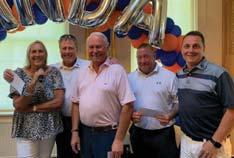
Pictured are the golf day winners, Wayne Sinfi eld, John Dall, Alex Hudson and Paul Roper with Branch Chair, Maureen O’Neill
PEOPLE living with MND were joined by scientists, musicians and poets for a special online event celebrating creativity, hope and life.
Hosted by the Euan MacDonald Centre for MND Research, the event, filmed in Edinburgh in August, featured poetry set to music along with contributions from researchers.
Among the poets who took part was Ian Lev who is living with Primary Lateral Sclerosis (PLS). Ian was invited to write a poem by organiser, Dr Maria Stavrou, based on his own personal experience of MND.
He said: “In my early 20s I used to be the vocalist in a rock band and wrote the lyrics for our own songs - so composing words wasn’t strange to me! Years later I was diagnosed with PLS and after a couple of years I started to post a regular Friday poem on Facebook called Raising awareness of MND. I used to get a few likes from followers and friends, and somebody flagged Maria’s project. I sent

Poet, Ian Lev, who is living with MND
her an email along with a few of my poems saying I would be interested – the response was positive!”
Ian wrote a poem called Why I write, which was set to music and recorded for the event by poet Georgi Gill.
Ian said: “I didn’t see the performance until the night of the premiere. I did shed a few tears and I also was very proud. I thought the whole thing flowed very well and the other poems were very good too!”
For more poetry written by readers of Thumb Print, turn to page 39.
Members share their experiences of MND
MEMBERS of both Mid Kent Support Groups met with Helen Whately MP in January to share their experiences of what it’s like to live with MND.
Speaking via video call, members of the groups were able to explain the challenges of being diagnosed with MND and discuss ways in which the Government might be able to offer more support.
Jean Lear from the Mid Kent Support Group described the call as ‘emotional’ but added that she hoped the experience had helped Mrs Whately who is MP for Faversham and Mid Kent and the former Minister for Social Care, understand more about the challenges people living with MND face.
For the latest on the #United2End MND campaign turn to page 6 and 7.
hope A gift in your Will could give of a world free from MND
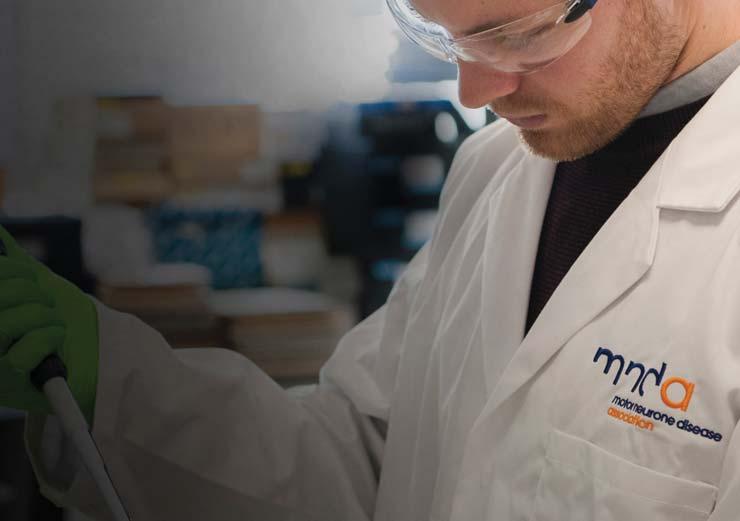
Please help us create a world free from MND for future generations with a gift in your Will. To request an information pack please call 01604 611898 or email legacies@mndassociation.org or visit www.mndassociation.org/wills

A summer garden party held in honour of Marian ‘Maz’ Swann raised £22,000
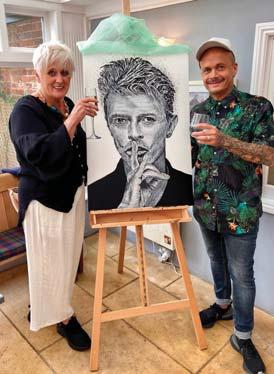
Cheers to that! Summer garden party raises £22,000
ASUMMER garden party helped raise an incredible £22,000 to help fight MND.
Forresters hair salon group and The Old Boot Inn at Stanford Dingley, near Reading, joined forces on 25 July to host the sparkling event in honour of Marian ‘Maz’ Swann who was recently diagnosed with MND and is a muchloved member of the Forresters team.
John Forrester, who founded the salon with his wife Jill 50 years ago, said: “It was a fabulous evening with drinks, delicious food, music, dancing, an auction and raffle.
“It was the first time in 18 months that a group of people could come together to have a wonderful evening and raise money for charity. Maz’s diagnosis has been a shock for everyone but we’re able to do something positive by raising funds for the Association which is helping Maz to live her life to the full.”
Andre Claassen and Rebecca James from The Old Boot Inn also have personal experience of MND as Andre’s sister Sharon Budde died from the disease in April.
Jane Gilbert, from the Association’s Reading and West Berkshire Branch, said the evening had been a huge success.
She explained: “This amazing generosity will help us improve care and support for local people living with MND, their families and carers.”
To donate to the charity’s event page visit: https://localgiving.org/appeal/ forresters/
“Maz’s diagnosis has been a shock for everyone but we’re able to do something positive by raising funds for the Association which is helping Maz to live her life to the full.”
The perfect tee for MND
HERE’S Kate Inchley, chair of the Northamptonshire Branch of the Association teeing off for her own 7 in 7 Challenge.
Inspired by MND Association patron, Kevin Sinfield MBE, Kate played seven rounds of golf in seven days in May, raising £1,371 for the Northamptonshire Branch.
She said: “On the first day it was cold, but the sunshine came out on the last day!”




